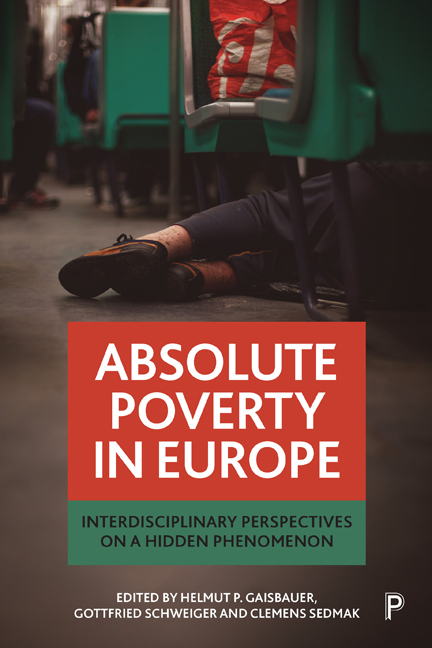Book contents
- Frontmatter
- Contents
- List of figures and tables
- Notes on contributors
- 1 Absolute poverty in Europe: introduction
- Part One Conceptual and methodological challenges
- Part Two Key issues for the absolute poor
- Part Three Policy responses to absolute poverty in Europe
- Part Four Ethical perspectives on absolute poverty in Europe
- Conclusion responding to the dark reality of absolute poverty in European welfare states
- Index
9 - Back to the origins: early interpersonal trauma and the intergenerational transmission of violence within the context of urban poverty
Published online by Cambridge University Press: 27 April 2022
- Frontmatter
- Contents
- List of figures and tables
- Notes on contributors
- 1 Absolute poverty in Europe: introduction
- Part One Conceptual and methodological challenges
- Part Two Key issues for the absolute poor
- Part Three Policy responses to absolute poverty in Europe
- Part Four Ethical perspectives on absolute poverty in Europe
- Conclusion responding to the dark reality of absolute poverty in European welfare states
- Index
Summary
Introduction
It is thought that 26% of European children under the age of 16 are at risk of poverty and social exclusion. This amounts to an estimated 22,106 children living in conditions of material deprivation or disadvantage within urban contexts in developed countries. It seems that this disadvantage may be transmitted intergenerationally across a large number of European households: 55% of difficulty in ‘making ends meet’ passes from childhood to adults’ current living situations (Eurostat, 2016).
Why does poverty show this tendency to pervade the lives of families across generations? What are the mechanisms for its perpetuation? While the answer to this complex question is beyond the scope of this paper, we believe that trauma, and particularly violence, when experienced from childhood, may be a main obstacle towards the overcoming of poverty across generations. Repeated exposure to violence may undermine people's functioning at a variety of dimensions that are essential for the individual's adaptation and ability to absorb adversity. It keeps us from acquiring effective, prosocial interaction strategies. It diminishes our capacity to develop effective ways of interpersonal communication. It compromises the development of empathy and altruism. It generates aversive emotions (fear, rage, helplessness) that may overcharge the person's cognitive resources that otherwise would enable them to learn. It creates chronic feelings of isolation and helplessness, leading to negative life expectations.
Evidence suggests that children living in poor inner city areas are more likely than those raised in more advantageous contexts to be exposed to psychological trauma (70–100%) (Fitzpatrick and Boldizar, 1993; Dempsey et al, 2000; Macyet al, 2003). Among different types of traumatic exposure related to poverty, violence is the most frequent. Studies suggest that levels of poverty are positively correlated to violence affecting the family (Hetling and Zhang, 2010; Aizer, 2011; Slabert, 2017), youth (Carlson, 2006; Rawles, 2010), and children (Gelles, 1992; Murphey, Cooper & Forry, 2013; Garo, 2013; Reza, 2016). A study suggests that the presence of violence among poor populations is more related to deprivation than to cultural differences characterising ‘the poor’ (Huff-Corzine et al, 1991).
- Type
- Chapter
- Information
- Absolute Poverty in EuropeInterdisciplinary Perspectives on a Hidden Phenomenon, pp. 183 - 210Publisher: Bristol University PressPrint publication year: 2019



